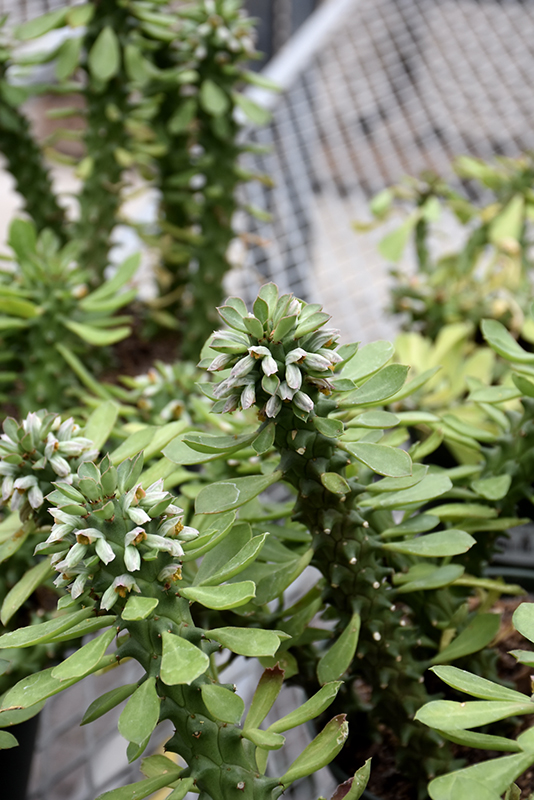Height: 24 inches
Spread: 18 inches
Sunlight:
![]()
Other Names: syn. Monadenium guentheri
Description:
An attractive, unusual plant for a bright area; long, unbranched, cylindrical stems, with prominent, spine-tipped tubercles and fleshy deciduous leaves; cream and red flowers with pale green bracts are subtle; a truly exotic indoor accent plant
Features & Attributes
Sausage Spurge is is a highly distinctive and unusual plant. Although it actually isn't technically a cactus, it is still a succulent evergreen which behaves much like a cactus. It is characterized by the highly modified and distinctive mottled cylindrical green stems that comprise the bulk of the plant, and which are designed to retain water for extended periods of time. Its attractive oval leaves remain light green in color with hints of chartreuse throughout the year. This plant has masses of beautiful clusters of creamy white flowers with antique red overtones and light green bracts held atop the stems from late winter to mid spring.
This is an open herbaceous houseplant with an upright spreading habit of growth. This plant may benefit from an occasional pruning to look its best.
Planting & Growing
When grown indoors, Sausage Spurge can be expected to grow to be about 24 inches tall at maturity, with a spread of 18 inches. It grows at a medium rate, and under ideal conditions can be expected to live for approximately 8 years. This houseplant requires direct sun for optimal performance, and should therefore be situated in a room that gets bright sunlight for a good part of the day; it is not a good choice for rooms lit only by artificial light. It prefers dry to average moisture levels with very well-drained soil, and may die if left in standing water for any length of time. This plant should be watered when the surface of the soil gets dry, and will need watering approximately once each week. Be aware that your particular watering schedule may vary depending on its location in the room, the pot size, plant size and other conditions; if in doubt, ask one of our experts in the store for advice. It will benefit from a regular feeding with a general-purpose fertilizer with every second or third watering. It is not particular as to soil pH, but grows best in sandy soil. Contact the store for specific recommendations on pre-mixed potting soil for this plant. Be warned that parts of this plant are known to be toxic to humans and animals, so special care should be exercised if growing it around children and pets.
There are many factors that will affect the ultimate height, spread and overall performance of a plant when grown indoors; among them, the size of the pot it's growing in, the amount of light it receives, watering frequency, the pruning regimen and repotting schedule. Use the information described here as a guideline only; individual performance can and will vary. Please contact the store to speak with one of our experts if you are interested in further details concerning recommendations on pot size, watering, pruning, repotting, etc.
-- THIS IS A HOUSEPLANT AND IS NOT MEANT TO SURVIVE THE WINTER OUTDOORS IN OUR CLIMATE --

